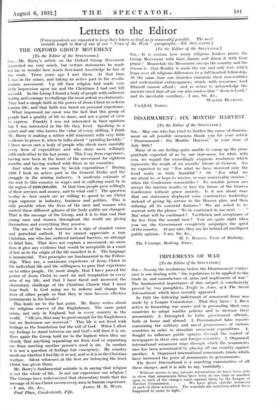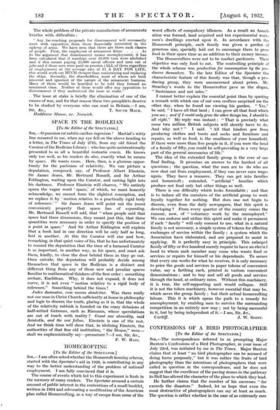IMPLEMENTS OF WAR [To the Editor of the SPECTATOR.] SIR,—Among
the resolutions before the Disarmament Confer- ence is one dealing with 'the regulations to be applied to the trade in, and manufacture of, arms and implements of war."
The fundamental importance of this subject is conclusively proved by two pamphlets, Traffic in Arms, arl The Secret International, which have recently appeared.
In 1921 the following indictment of armament firms was made by a League Commission : That they have : 1. Been active in fomenting war scares and in persuading their own countries to adopt warlike policies and to increase their armaments. 2. Attempted to bribe government officials, both at home and abroad. 3. Disseminated false reports concerning the military and naval programmes of various countries in order to stimulate armament expenditure. 4. Sought to influence public opinion through the control of newspapers in their own and foreign countries. 5. Organized international armament rings through which the armaments race has been accentuated by playing off one country against another. 6. Organized international armaments trusts which have increased the price of armaments to governments.
The Secret International is a searching examination of all these charges, and it is able to say, truthfully : "Without access to any private information we have been ablo to show that armaments firms have been at one time or another open to each of the charges made against them by the League of Nations Commission. . . . We have given specific instances of each of these activities. The scandals are instances which have happened to come to light."
The whole problem of the private manufacture of armaments bristles with, difficulties:
"Any far-reaching proposals for disarmament will necessarily meet with opposition from those financially interested in the upkeep of arms. We have seen that there are three such classes of people. Fircit, the employees of armament firms. . . . As to the argument that disarmament means unemployment, it has been calculated that if warships over 10,000 tons were abolished and if this meant paying 25,000 naval officers and men out of jobs and if these men were paid on pension (ALL of them regardless of employment) at the average rate of 1 A DAY FOR LIFE, this would work out MUCH cheaper than maintaining and replacing the ships. Secondly, the shareholders, most of whom are both innocent and ignorant of the nature of the armament business. Many of them would be horrified to be told they formed an armament class. Neither of these would offer any opposition to disarmament if they understood the issue at stake."
The issue at stake is briefly the elimination of one of the causes of war, and for that reason these two pamphlets deserve to be studied by everyone who can read in Britain.—I am, Sir, &c., T. SOUTH MACH. Haddiscoe Manor, nr. Norwich.



























 Previous page
Previous page